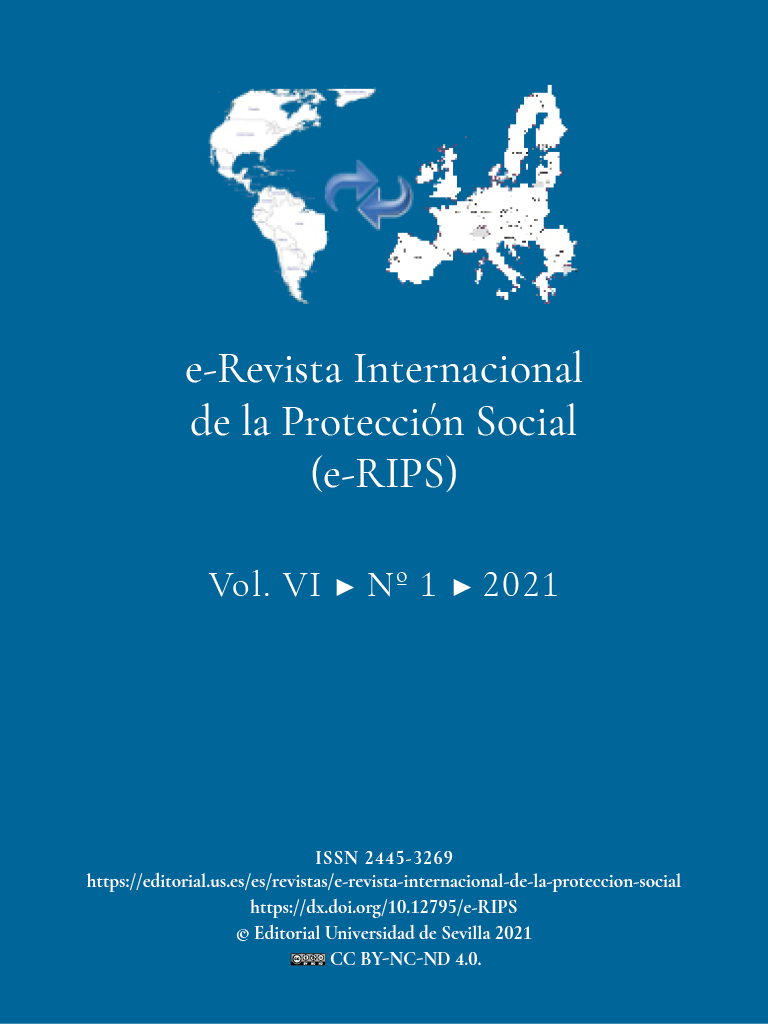THE IMPACT OF DIGITAL TECHNOLOGIES ON THE ORGANISATION OF WORK
DOI:
https://doi.org/10.12795/e-RIPS.2021.i01.18Keywords:
Flexibility, Work, New technologies, DigitalizationAbstract
The vertiginous technological-digital advance that has been taking place for a relatively short time has transformed the classic configuration of labor relations. Analyzing the form and scope that its impact is having on the workplace consequently becomes a fundamental question to be able to find those measures that allow minimizing the inconveniences faced by both workers and companies. This work seeks, on the one hand, to offer a panoramic view of this impact and, on the other, to analyze the way in which companies internalize these advances.
Downloads
References
Autor, D. H.: “Why Are There Still So Many Jobs? The History and Future of Workplace Automation”, Journal of Economic Perspectives, vol. 29, num. 3, September, 2015.
Carinci, F.: “Rivoluzione tecnológica e Diritto del Lavoro: il rapporto individuale”, Giornale di diritto del lavoro e di relazioni industriali, núm. 25, 1985.
Cedrola Spremolla, G.: “El trabajo en la era digital: reflexiones sobre el impacto de la digitalización en el trabajo, la regulación laboral y las relaciones laborales”, Revista de Derecho de la Universidad de Montevideo, núm. 31, 2017.
Cruz Villalón, J.: “Nuevas funciones de la negociación colectiva y alteración de su marco normativo”, Revista de Economía Laboral, vol. 13 (2), 2016.
Cruz Villalón, J.: Compendio de Derecho del Trabajo, Tecnos, Madrid, 2017.
Frey C. B. y Osborne, M.: “The future of employment: how susceptible are jobs to computerization?”, Oxford University, September, 2013.
McKee, A.: “Being Happy at Work Matters”, Harvard Business Review, 2014.
Mokyr, J.; Vickers, C. y Ziebarth, N. L.: “The History of Technological Anxiety and the Future of Economic Growth: Is This Time Different?”, The Journal of Economic Perspectives, vol. 29, núm. 3, 2015.
Moreira, T.C.: “El impacto de las nuevas tecnologías sobre la conciliación entre vida personal y trabajo”, Labour & Law Issues, vol. 3, núm. 1, 2017.
Moreno Vida, M. N.: “Las facultades de control fuera de la jornada de trabajo: desconexión digital y control del trabajador”. Temas Laborales, núm. 150, 2019.
Porter, M. E.: “The Competitive Advantage: Creating and Sustaining Superior Performance”, New York: Free Press, 1985.
Purcalla Bonilla, M. Á.: “Globalización económica, Derecho del Trabajo y de la Seguridad Social y retos sindicales: notas para el debate”, Aranzadi Social, vol. V, 2002.
Rodríguez, J. M.: “Transformaciones tecnológicas, su impacto en el mercado de trabajo y retos para las políticas del mercado de trabajo”, CEPAL, Naciones Unidas, Santiago, 2017.
Weller, J.: “Las transformaciones tecnológicas y su impacto en los mercados laborales”. CEPAL - Serie Macroeconomía del Desarrollo, núm. 190, Naciones Unidas, Santiago, 2017.
Published
How to Cite
Issue
Section
License
Authors being published in this journal agree to the following terms:
- Authors retain their copyright and they will guarantee to the journal the right of first publication of their work, which will be simultaneously subject to license recognition by Attribution-NonCommercial-ShareAlike (CC BY-NC-SA 4.0 DEED)
that allows others to share such work provided that the author’s name and his first publication in the e-International Review on Social Protection is stated. - Authors may take other non-exclusive distribution license agreements version of the published work (e.g. deposit in an institutional digital file or publication in a monographic volume) provided that the initial publication in this journal is stated.
- Authors are allowed and encouraged to disseminate their work via the Internet (e.g. in institutional digital files or on their website) prior to and during the submission process, which can lead to interesting exchanges and to increase citation of the published work.











